Organizational Behaviour Report: Busaba Ethai Analysis
VerifiedAdded on 2021/02/21
|14
|3999
|246
Report
AI Summary
This report provides a comprehensive analysis of organizational behaviour, focusing on the case study of Busaba Ethai, a UK-based restaurant chain. The report begins with an examination of how organizational culture, politics, and power dynamics influence individual and team behaviour and performance within the company. It delves into Handy's model of organizational culture, exploring power, role, task, and person cultures and their impact on employees. The report also analyzes the positive and negative effects of organizational politics and the various types of power, including coercive, reward, legitimate, referent, and expert power, and their relevance to Busaba Ethai. Furthermore, the report investigates how to influence the behaviour of others through the effective application of behavioural motivational theories, concepts, and models. It explores Maslow's Hierarchy of Needs and its application in motivating employees. The report concludes with a discussion of philosophies for influencing employee behaviour in the workplace to achieve desired organizational results.
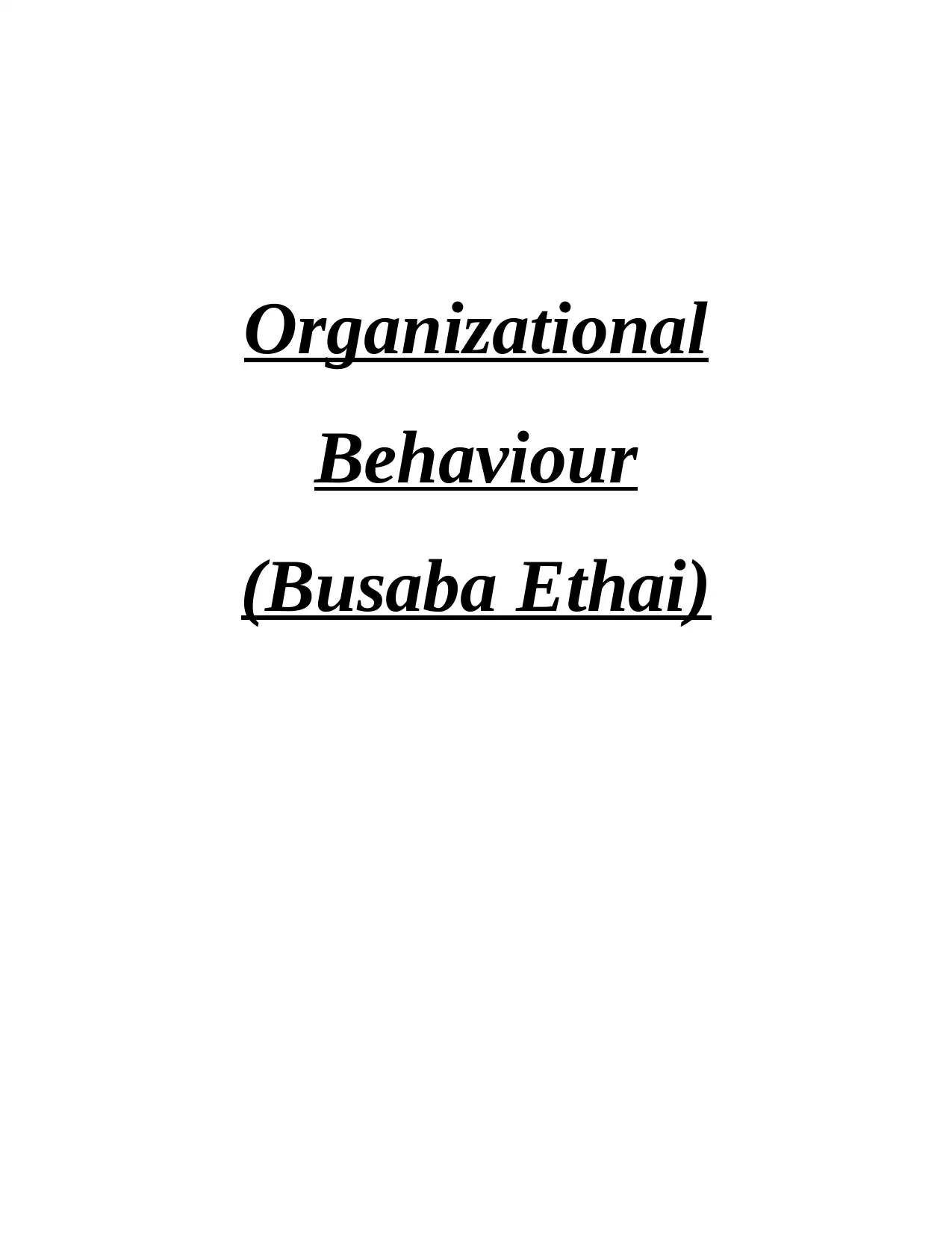
Organizational
Behaviour
(Busaba Ethai)
Behaviour
(Busaba Ethai)
Paraphrase This Document
Need a fresh take? Get an instant paraphrase of this document with our AI Paraphraser
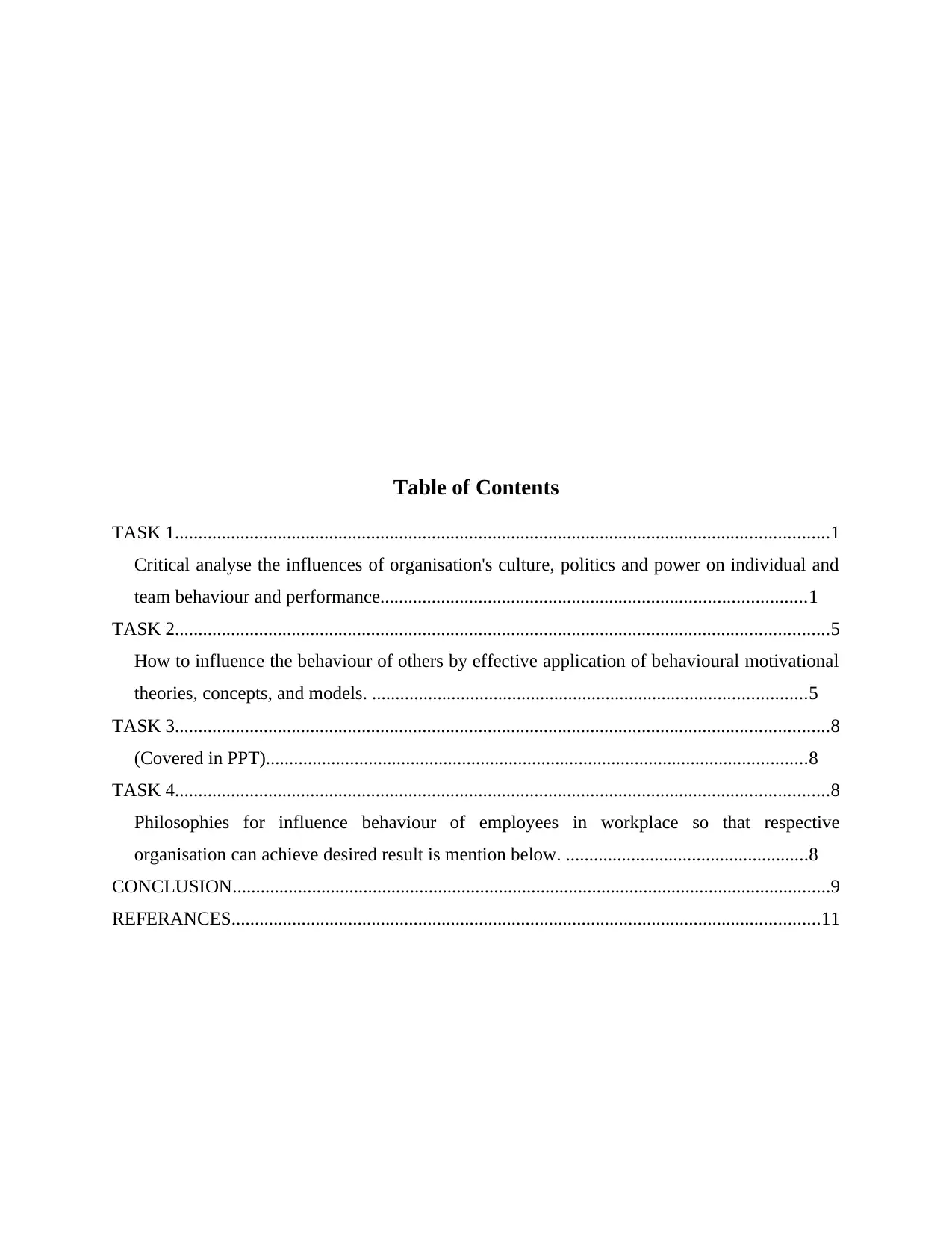
Table of Contents
TASK 1............................................................................................................................................1
Critical analyse the influences of organisation's culture, politics and power on individual and
team behaviour and performance...........................................................................................1
TASK 2............................................................................................................................................5
How to influence the behaviour of others by effective application of behavioural motivational
theories, concepts, and models. .............................................................................................5
TASK 3............................................................................................................................................8
(Covered in PPT)....................................................................................................................8
TASK 4............................................................................................................................................8
Philosophies for influence behaviour of employees in workplace so that respective
organisation can achieve desired result is mention below. ....................................................8
CONCLUSION................................................................................................................................9
REFERANCES..............................................................................................................................11
TASK 1............................................................................................................................................1
Critical analyse the influences of organisation's culture, politics and power on individual and
team behaviour and performance...........................................................................................1
TASK 2............................................................................................................................................5
How to influence the behaviour of others by effective application of behavioural motivational
theories, concepts, and models. .............................................................................................5
TASK 3............................................................................................................................................8
(Covered in PPT)....................................................................................................................8
TASK 4............................................................................................................................................8
Philosophies for influence behaviour of employees in workplace so that respective
organisation can achieve desired result is mention below. ....................................................8
CONCLUSION................................................................................................................................9
REFERANCES..............................................................................................................................11
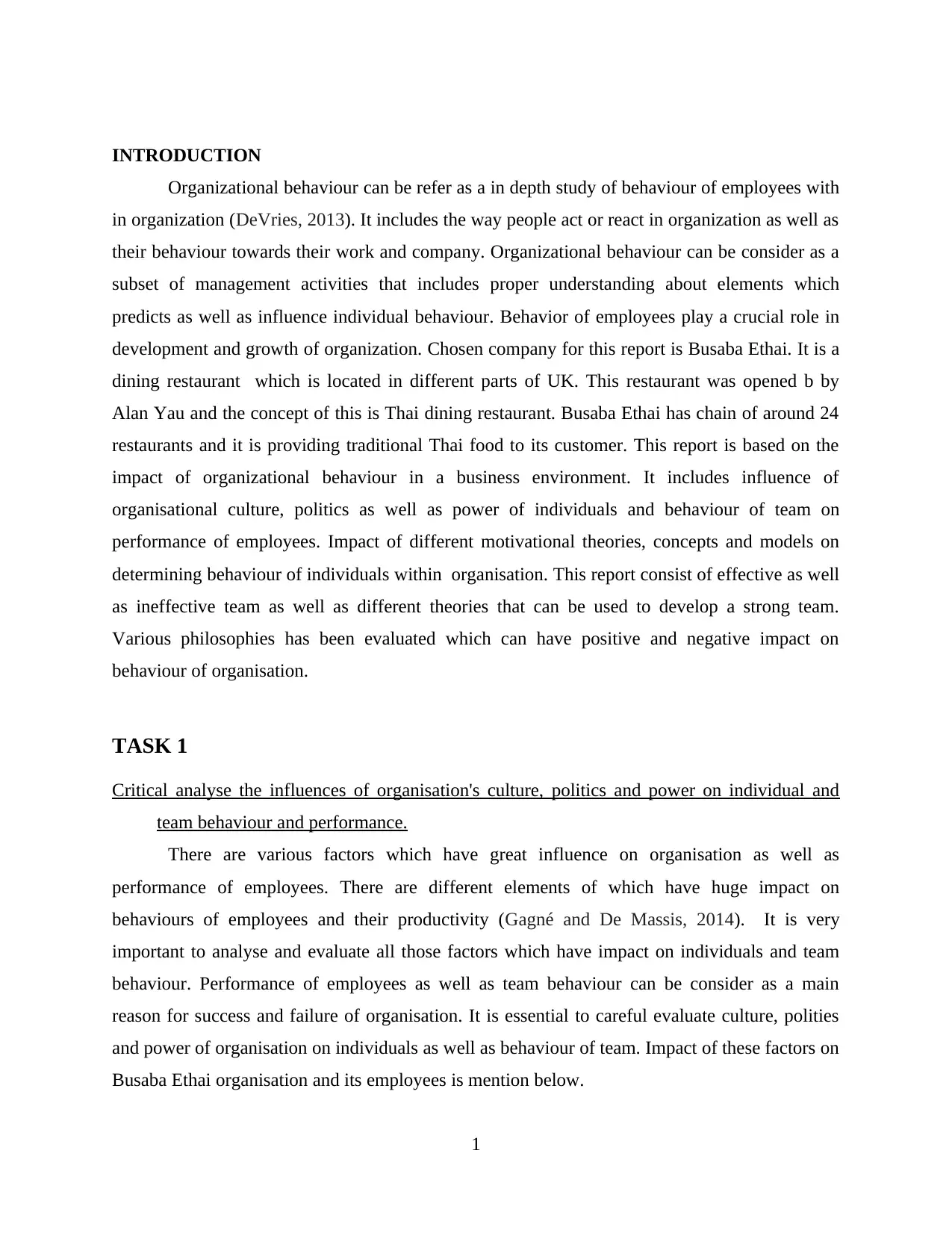
INTRODUCTION
Organizational behaviour can be refer as a in depth study of behaviour of employees with
in organization (DeVries, 2013). It includes the way people act or react in organization as well as
their behaviour towards their work and company. Organizational behaviour can be consider as a
subset of management activities that includes proper understanding about elements which
predicts as well as influence individual behaviour. Behavior of employees play a crucial role in
development and growth of organization. Chosen company for this report is Busaba Ethai. It is a
dining restaurant which is located in different parts of UK. This restaurant was opened b by
Alan Yau and the concept of this is Thai dining restaurant. Busaba Ethai has chain of around 24
restaurants and it is providing traditional Thai food to its customer. This report is based on the
impact of organizational behaviour in a business environment. It includes influence of
organisational culture, politics as well as power of individuals and behaviour of team on
performance of employees. Impact of different motivational theories, concepts and models on
determining behaviour of individuals within organisation. This report consist of effective as well
as ineffective team as well as different theories that can be used to develop a strong team.
Various philosophies has been evaluated which can have positive and negative impact on
behaviour of organisation.
TASK 1
Critical analyse the influences of organisation's culture, politics and power on individual and
team behaviour and performance.
There are various factors which have great influence on organisation as well as
performance of employees. There are different elements of which have huge impact on
behaviours of employees and their productivity (Gagné and De Massis, 2014). It is very
important to analyse and evaluate all those factors which have impact on individuals and team
behaviour. Performance of employees as well as team behaviour can be consider as a main
reason for success and failure of organisation. It is essential to careful evaluate culture, polities
and power of organisation on individuals as well as behaviour of team. Impact of these factors on
Busaba Ethai organisation and its employees is mention below.
1
Organizational behaviour can be refer as a in depth study of behaviour of employees with
in organization (DeVries, 2013). It includes the way people act or react in organization as well as
their behaviour towards their work and company. Organizational behaviour can be consider as a
subset of management activities that includes proper understanding about elements which
predicts as well as influence individual behaviour. Behavior of employees play a crucial role in
development and growth of organization. Chosen company for this report is Busaba Ethai. It is a
dining restaurant which is located in different parts of UK. This restaurant was opened b by
Alan Yau and the concept of this is Thai dining restaurant. Busaba Ethai has chain of around 24
restaurants and it is providing traditional Thai food to its customer. This report is based on the
impact of organizational behaviour in a business environment. It includes influence of
organisational culture, politics as well as power of individuals and behaviour of team on
performance of employees. Impact of different motivational theories, concepts and models on
determining behaviour of individuals within organisation. This report consist of effective as well
as ineffective team as well as different theories that can be used to develop a strong team.
Various philosophies has been evaluated which can have positive and negative impact on
behaviour of organisation.
TASK 1
Critical analyse the influences of organisation's culture, politics and power on individual and
team behaviour and performance.
There are various factors which have great influence on organisation as well as
performance of employees. There are different elements of which have huge impact on
behaviours of employees and their productivity (Gagné and De Massis, 2014). It is very
important to analyse and evaluate all those factors which have impact on individuals and team
behaviour. Performance of employees as well as team behaviour can be consider as a main
reason for success and failure of organisation. It is essential to careful evaluate culture, polities
and power of organisation on individuals as well as behaviour of team. Impact of these factors on
Busaba Ethai organisation and its employees is mention below.
1
⊘ This is a preview!⊘
Do you want full access?
Subscribe today to unlock all pages.

Trusted by 1+ million students worldwide
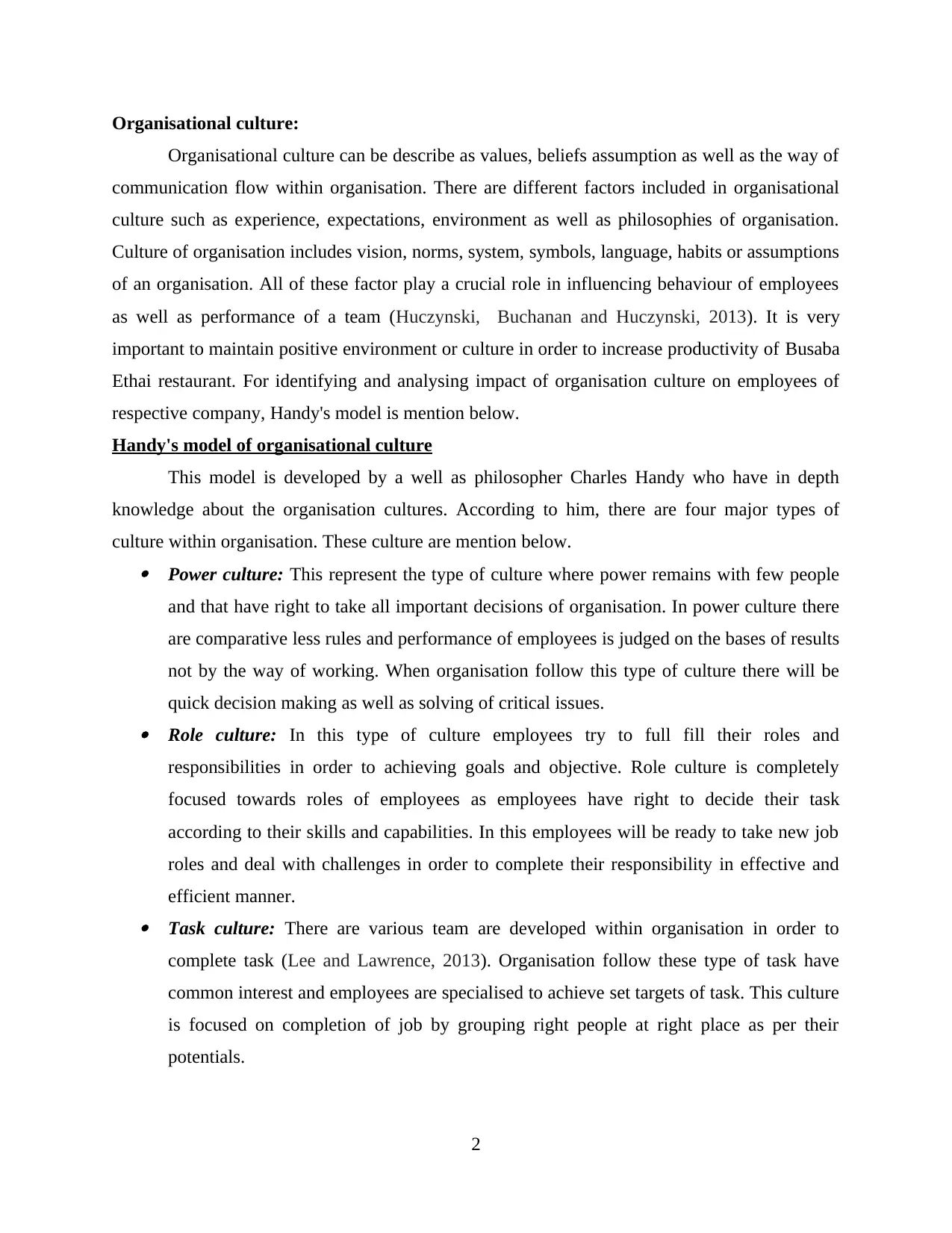
Organisational culture:
Organisational culture can be describe as values, beliefs assumption as well as the way of
communication flow within organisation. There are different factors included in organisational
culture such as experience, expectations, environment as well as philosophies of organisation.
Culture of organisation includes vision, norms, system, symbols, language, habits or assumptions
of an organisation. All of these factor play a crucial role in influencing behaviour of employees
as well as performance of a team (Huczynski, Buchanan and Huczynski, 2013). It is very
important to maintain positive environment or culture in order to increase productivity of Busaba
Ethai restaurant. For identifying and analysing impact of organisation culture on employees of
respective company, Handy's model is mention below.
Handy's model of organisational culture
This model is developed by a well as philosopher Charles Handy who have in depth
knowledge about the organisation cultures. According to him, there are four major types of
culture within organisation. These culture are mention below. Power culture: This represent the type of culture where power remains with few people
and that have right to take all important decisions of organisation. In power culture there
are comparative less rules and performance of employees is judged on the bases of results
not by the way of working. When organisation follow this type of culture there will be
quick decision making as well as solving of critical issues. Role culture: In this type of culture employees try to full fill their roles and
responsibilities in order to achieving goals and objective. Role culture is completely
focused towards roles of employees as employees have right to decide their task
according to their skills and capabilities. In this employees will be ready to take new job
roles and deal with challenges in order to complete their responsibility in effective and
efficient manner. Task culture: There are various team are developed within organisation in order to
complete task (Lee and Lawrence, 2013). Organisation follow these type of task have
common interest and employees are specialised to achieve set targets of task. This culture
is focused on completion of job by grouping right people at right place as per their
potentials.
2
Organisational culture can be describe as values, beliefs assumption as well as the way of
communication flow within organisation. There are different factors included in organisational
culture such as experience, expectations, environment as well as philosophies of organisation.
Culture of organisation includes vision, norms, system, symbols, language, habits or assumptions
of an organisation. All of these factor play a crucial role in influencing behaviour of employees
as well as performance of a team (Huczynski, Buchanan and Huczynski, 2013). It is very
important to maintain positive environment or culture in order to increase productivity of Busaba
Ethai restaurant. For identifying and analysing impact of organisation culture on employees of
respective company, Handy's model is mention below.
Handy's model of organisational culture
This model is developed by a well as philosopher Charles Handy who have in depth
knowledge about the organisation cultures. According to him, there are four major types of
culture within organisation. These culture are mention below. Power culture: This represent the type of culture where power remains with few people
and that have right to take all important decisions of organisation. In power culture there
are comparative less rules and performance of employees is judged on the bases of results
not by the way of working. When organisation follow this type of culture there will be
quick decision making as well as solving of critical issues. Role culture: In this type of culture employees try to full fill their roles and
responsibilities in order to achieving goals and objective. Role culture is completely
focused towards roles of employees as employees have right to decide their task
according to their skills and capabilities. In this employees will be ready to take new job
roles and deal with challenges in order to complete their responsibility in effective and
efficient manner. Task culture: There are various team are developed within organisation in order to
complete task (Lee and Lawrence, 2013). Organisation follow these type of task have
common interest and employees are specialised to achieve set targets of task. This culture
is focused on completion of job by grouping right people at right place as per their
potentials.
2
Paraphrase This Document
Need a fresh take? Get an instant paraphrase of this document with our AI Paraphraser
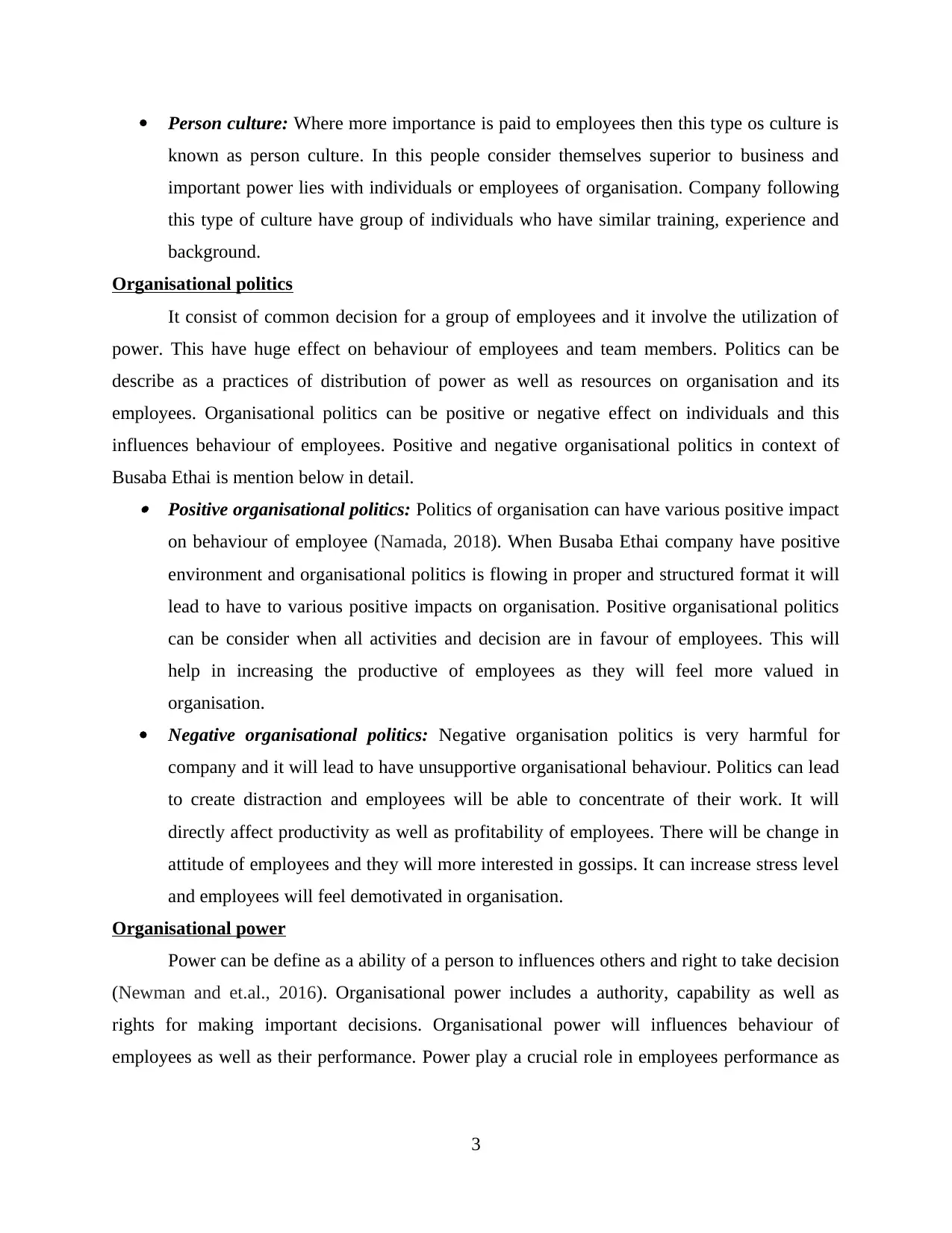
Person culture: Where more importance is paid to employees then this type os culture is
known as person culture. In this people consider themselves superior to business and
important power lies with individuals or employees of organisation. Company following
this type of culture have group of individuals who have similar training, experience and
background.
Organisational politics
It consist of common decision for a group of employees and it involve the utilization of
power. This have huge effect on behaviour of employees and team members. Politics can be
describe as a practices of distribution of power as well as resources on organisation and its
employees. Organisational politics can be positive or negative effect on individuals and this
influences behaviour of employees. Positive and negative organisational politics in context of
Busaba Ethai is mention below in detail. Positive organisational politics: Politics of organisation can have various positive impact
on behaviour of employee (Namada, 2018). When Busaba Ethai company have positive
environment and organisational politics is flowing in proper and structured format it will
lead to have to various positive impacts on organisation. Positive organisational politics
can be consider when all activities and decision are in favour of employees. This will
help in increasing the productive of employees as they will feel more valued in
organisation.
Negative organisational politics: Negative organisation politics is very harmful for
company and it will lead to have unsupportive organisational behaviour. Politics can lead
to create distraction and employees will be able to concentrate of their work. It will
directly affect productivity as well as profitability of employees. There will be change in
attitude of employees and they will more interested in gossips. It can increase stress level
and employees will feel demotivated in organisation.
Organisational power
Power can be define as a ability of a person to influences others and right to take decision
(Newman and et.al., 2016). Organisational power includes a authority, capability as well as
rights for making important decisions. Organisational power will influences behaviour of
employees as well as their performance. Power play a crucial role in employees performance as
3
known as person culture. In this people consider themselves superior to business and
important power lies with individuals or employees of organisation. Company following
this type of culture have group of individuals who have similar training, experience and
background.
Organisational politics
It consist of common decision for a group of employees and it involve the utilization of
power. This have huge effect on behaviour of employees and team members. Politics can be
describe as a practices of distribution of power as well as resources on organisation and its
employees. Organisational politics can be positive or negative effect on individuals and this
influences behaviour of employees. Positive and negative organisational politics in context of
Busaba Ethai is mention below in detail. Positive organisational politics: Politics of organisation can have various positive impact
on behaviour of employee (Namada, 2018). When Busaba Ethai company have positive
environment and organisational politics is flowing in proper and structured format it will
lead to have to various positive impacts on organisation. Positive organisational politics
can be consider when all activities and decision are in favour of employees. This will
help in increasing the productive of employees as they will feel more valued in
organisation.
Negative organisational politics: Negative organisation politics is very harmful for
company and it will lead to have unsupportive organisational behaviour. Politics can lead
to create distraction and employees will be able to concentrate of their work. It will
directly affect productivity as well as profitability of employees. There will be change in
attitude of employees and they will more interested in gossips. It can increase stress level
and employees will feel demotivated in organisation.
Organisational power
Power can be define as a ability of a person to influences others and right to take decision
(Newman and et.al., 2016). Organisational power includes a authority, capability as well as
rights for making important decisions. Organisational power will influences behaviour of
employees as well as their performance. Power play a crucial role in employees performance as
3
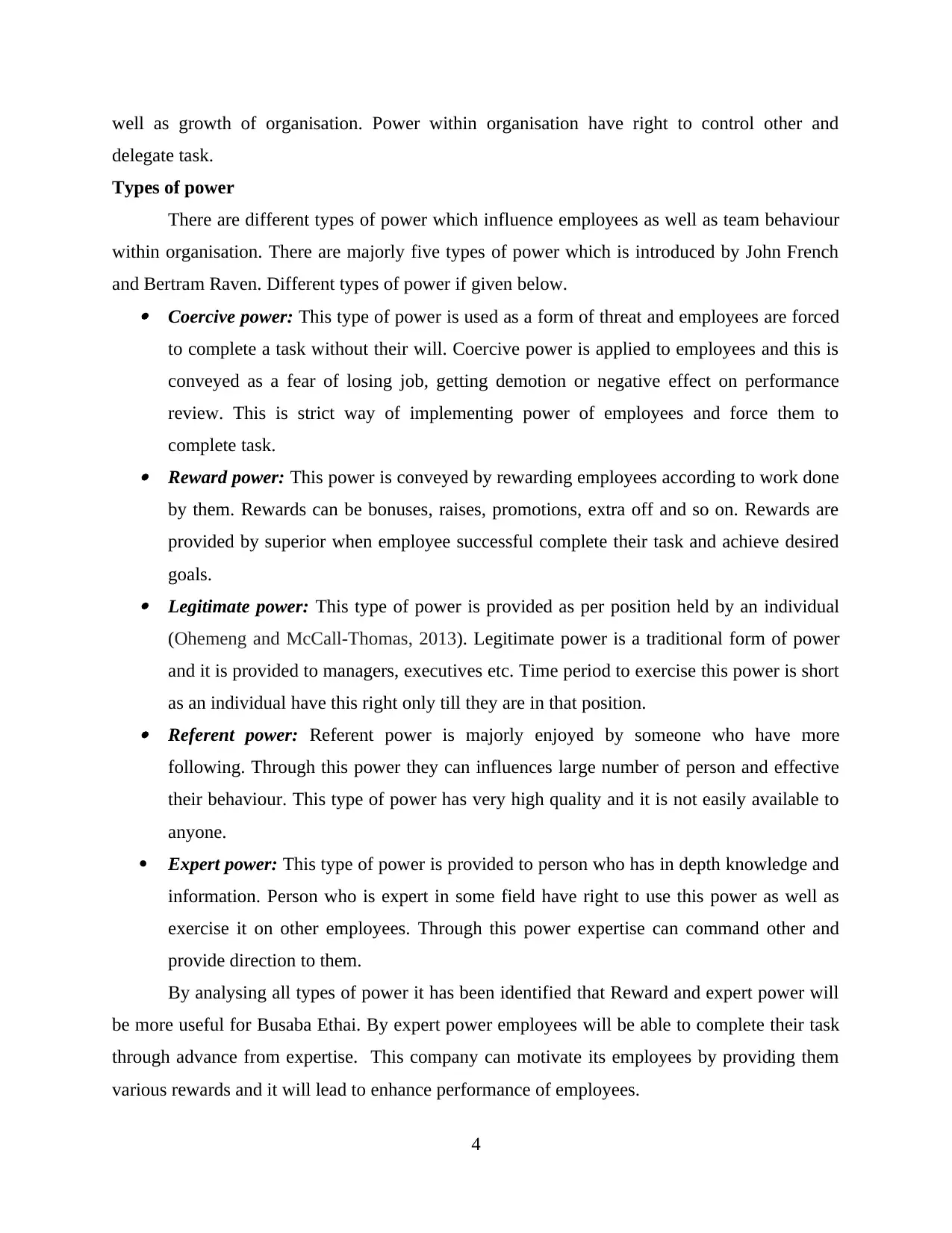
well as growth of organisation. Power within organisation have right to control other and
delegate task.
Types of power
There are different types of power which influence employees as well as team behaviour
within organisation. There are majorly five types of power which is introduced by John French
and Bertram Raven. Different types of power if given below. Coercive power: This type of power is used as a form of threat and employees are forced
to complete a task without their will. Coercive power is applied to employees and this is
conveyed as a fear of losing job, getting demotion or negative effect on performance
review. This is strict way of implementing power of employees and force them to
complete task. Reward power: This power is conveyed by rewarding employees according to work done
by them. Rewards can be bonuses, raises, promotions, extra off and so on. Rewards are
provided by superior when employee successful complete their task and achieve desired
goals. Legitimate power: This type of power is provided as per position held by an individual
(Ohemeng and McCall‐Thomas, 2013). Legitimate power is a traditional form of power
and it is provided to managers, executives etc. Time period to exercise this power is short
as an individual have this right only till they are in that position. Referent power: Referent power is majorly enjoyed by someone who have more
following. Through this power they can influences large number of person and effective
their behaviour. This type of power has very high quality and it is not easily available to
anyone.
Expert power: This type of power is provided to person who has in depth knowledge and
information. Person who is expert in some field have right to use this power as well as
exercise it on other employees. Through this power expertise can command other and
provide direction to them.
By analysing all types of power it has been identified that Reward and expert power will
be more useful for Busaba Ethai. By expert power employees will be able to complete their task
through advance from expertise. This company can motivate its employees by providing them
various rewards and it will lead to enhance performance of employees.
4
delegate task.
Types of power
There are different types of power which influence employees as well as team behaviour
within organisation. There are majorly five types of power which is introduced by John French
and Bertram Raven. Different types of power if given below. Coercive power: This type of power is used as a form of threat and employees are forced
to complete a task without their will. Coercive power is applied to employees and this is
conveyed as a fear of losing job, getting demotion or negative effect on performance
review. This is strict way of implementing power of employees and force them to
complete task. Reward power: This power is conveyed by rewarding employees according to work done
by them. Rewards can be bonuses, raises, promotions, extra off and so on. Rewards are
provided by superior when employee successful complete their task and achieve desired
goals. Legitimate power: This type of power is provided as per position held by an individual
(Ohemeng and McCall‐Thomas, 2013). Legitimate power is a traditional form of power
and it is provided to managers, executives etc. Time period to exercise this power is short
as an individual have this right only till they are in that position. Referent power: Referent power is majorly enjoyed by someone who have more
following. Through this power they can influences large number of person and effective
their behaviour. This type of power has very high quality and it is not easily available to
anyone.
Expert power: This type of power is provided to person who has in depth knowledge and
information. Person who is expert in some field have right to use this power as well as
exercise it on other employees. Through this power expertise can command other and
provide direction to them.
By analysing all types of power it has been identified that Reward and expert power will
be more useful for Busaba Ethai. By expert power employees will be able to complete their task
through advance from expertise. This company can motivate its employees by providing them
various rewards and it will lead to enhance performance of employees.
4
⊘ This is a preview!⊘
Do you want full access?
Subscribe today to unlock all pages.

Trusted by 1+ million students worldwide
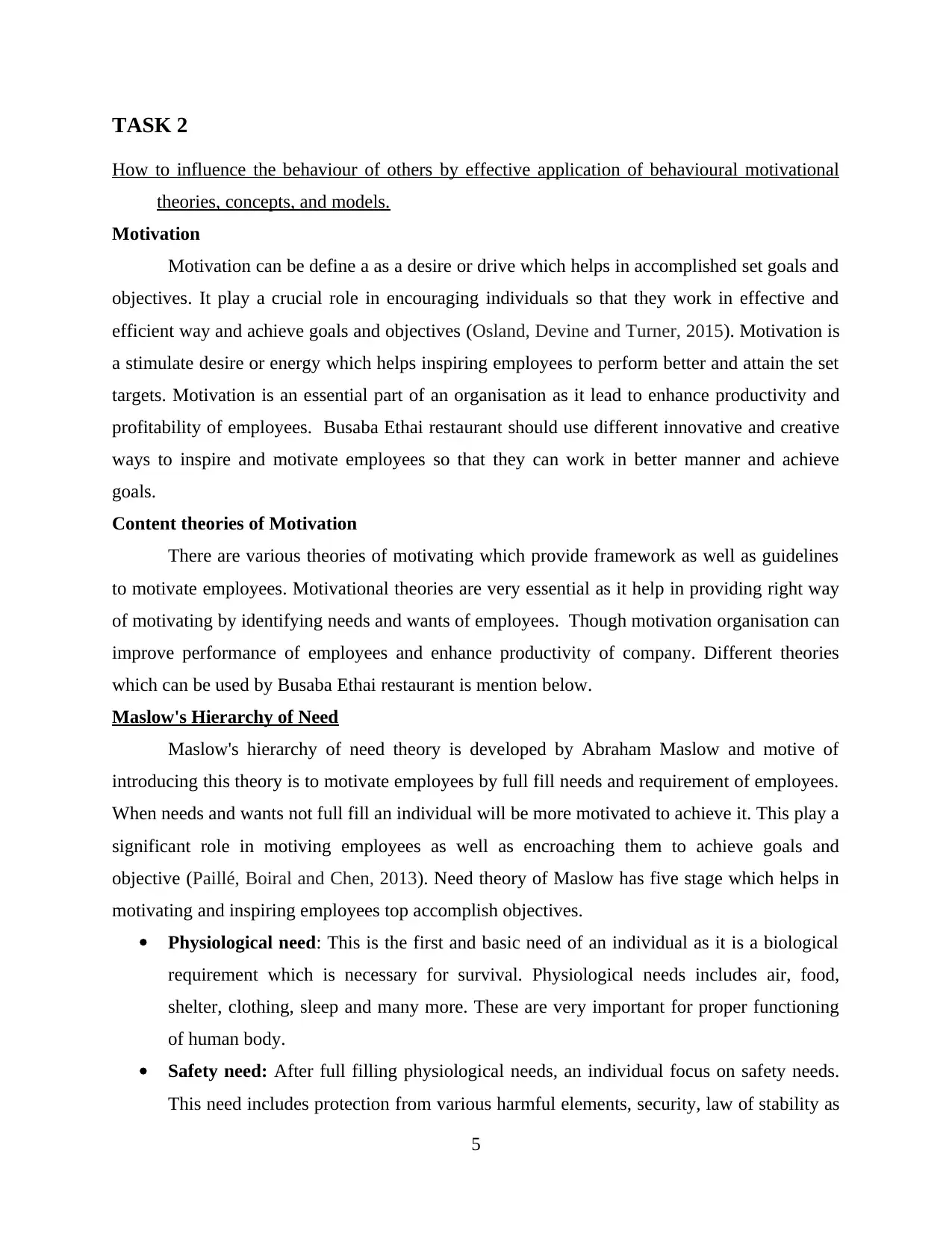
TASK 2
How to influence the behaviour of others by effective application of behavioural motivational
theories, concepts, and models.
Motivation
Motivation can be define a as a desire or drive which helps in accomplished set goals and
objectives. It play a crucial role in encouraging individuals so that they work in effective and
efficient way and achieve goals and objectives (Osland, Devine and Turner, 2015). Motivation is
a stimulate desire or energy which helps inspiring employees to perform better and attain the set
targets. Motivation is an essential part of an organisation as it lead to enhance productivity and
profitability of employees. Busaba Ethai restaurant should use different innovative and creative
ways to inspire and motivate employees so that they can work in better manner and achieve
goals.
Content theories of Motivation
There are various theories of motivating which provide framework as well as guidelines
to motivate employees. Motivational theories are very essential as it help in providing right way
of motivating by identifying needs and wants of employees. Though motivation organisation can
improve performance of employees and enhance productivity of company. Different theories
which can be used by Busaba Ethai restaurant is mention below.
Maslow's Hierarchy of Need
Maslow's hierarchy of need theory is developed by Abraham Maslow and motive of
introducing this theory is to motivate employees by full fill needs and requirement of employees.
When needs and wants not full fill an individual will be more motivated to achieve it. This play a
significant role in motiving employees as well as encroaching them to achieve goals and
objective (Paillé, Boiral and Chen, 2013). Need theory of Maslow has five stage which helps in
motivating and inspiring employees top accomplish objectives.
Physiological need: This is the first and basic need of an individual as it is a biological
requirement which is necessary for survival. Physiological needs includes air, food,
shelter, clothing, sleep and many more. These are very important for proper functioning
of human body.
Safety need: After full filling physiological needs, an individual focus on safety needs.
This need includes protection from various harmful elements, security, law of stability as
5
How to influence the behaviour of others by effective application of behavioural motivational
theories, concepts, and models.
Motivation
Motivation can be define a as a desire or drive which helps in accomplished set goals and
objectives. It play a crucial role in encouraging individuals so that they work in effective and
efficient way and achieve goals and objectives (Osland, Devine and Turner, 2015). Motivation is
a stimulate desire or energy which helps inspiring employees to perform better and attain the set
targets. Motivation is an essential part of an organisation as it lead to enhance productivity and
profitability of employees. Busaba Ethai restaurant should use different innovative and creative
ways to inspire and motivate employees so that they can work in better manner and achieve
goals.
Content theories of Motivation
There are various theories of motivating which provide framework as well as guidelines
to motivate employees. Motivational theories are very essential as it help in providing right way
of motivating by identifying needs and wants of employees. Though motivation organisation can
improve performance of employees and enhance productivity of company. Different theories
which can be used by Busaba Ethai restaurant is mention below.
Maslow's Hierarchy of Need
Maslow's hierarchy of need theory is developed by Abraham Maslow and motive of
introducing this theory is to motivate employees by full fill needs and requirement of employees.
When needs and wants not full fill an individual will be more motivated to achieve it. This play a
significant role in motiving employees as well as encroaching them to achieve goals and
objective (Paillé, Boiral and Chen, 2013). Need theory of Maslow has five stage which helps in
motivating and inspiring employees top accomplish objectives.
Physiological need: This is the first and basic need of an individual as it is a biological
requirement which is necessary for survival. Physiological needs includes air, food,
shelter, clothing, sleep and many more. These are very important for proper functioning
of human body.
Safety need: After full filling physiological needs, an individual focus on safety needs.
This need includes protection from various harmful elements, security, law of stability as
5
Paraphrase This Document
Need a fresh take? Get an instant paraphrase of this document with our AI Paraphraser
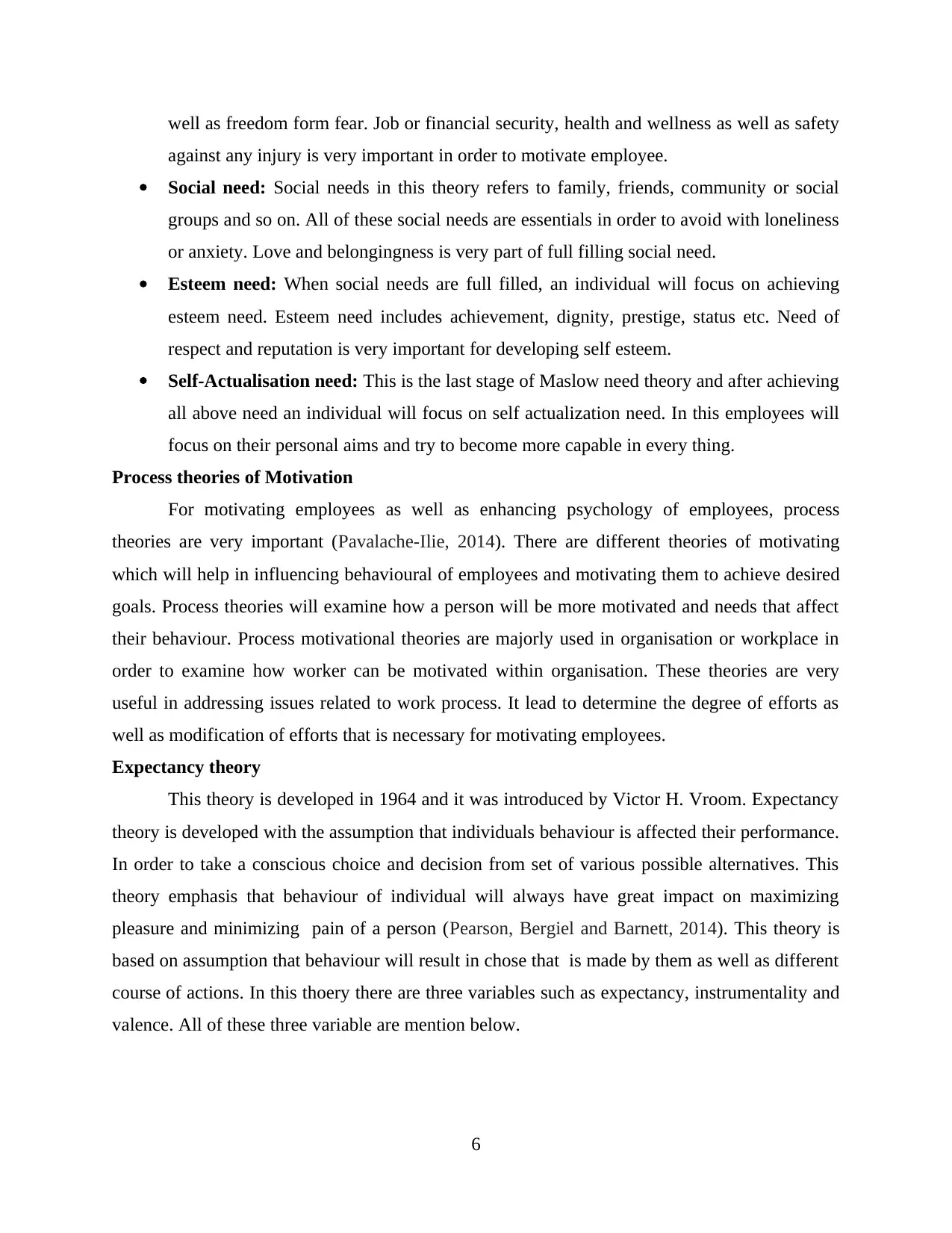
well as freedom form fear. Job or financial security, health and wellness as well as safety
against any injury is very important in order to motivate employee.
Social need: Social needs in this theory refers to family, friends, community or social
groups and so on. All of these social needs are essentials in order to avoid with loneliness
or anxiety. Love and belongingness is very part of full filling social need.
Esteem need: When social needs are full filled, an individual will focus on achieving
esteem need. Esteem need includes achievement, dignity, prestige, status etc. Need of
respect and reputation is very important for developing self esteem.
Self-Actualisation need: This is the last stage of Maslow need theory and after achieving
all above need an individual will focus on self actualization need. In this employees will
focus on their personal aims and try to become more capable in every thing.
Process theories of Motivation
For motivating employees as well as enhancing psychology of employees, process
theories are very important (Pavalache-Ilie, 2014). There are different theories of motivating
which will help in influencing behavioural of employees and motivating them to achieve desired
goals. Process theories will examine how a person will be more motivated and needs that affect
their behaviour. Process motivational theories are majorly used in organisation or workplace in
order to examine how worker can be motivated within organisation. These theories are very
useful in addressing issues related to work process. It lead to determine the degree of efforts as
well as modification of efforts that is necessary for motivating employees.
Expectancy theory
This theory is developed in 1964 and it was introduced by Victor H. Vroom. Expectancy
theory is developed with the assumption that individuals behaviour is affected their performance.
In order to take a conscious choice and decision from set of various possible alternatives. This
theory emphasis that behaviour of individual will always have great impact on maximizing
pleasure and minimizing pain of a person (Pearson, Bergiel and Barnett, 2014). This theory is
based on assumption that behaviour will result in chose that is made by them as well as different
course of actions. In this thoery there are three variables such as expectancy, instrumentality and
valence. All of these three variable are mention below.
6
against any injury is very important in order to motivate employee.
Social need: Social needs in this theory refers to family, friends, community or social
groups and so on. All of these social needs are essentials in order to avoid with loneliness
or anxiety. Love and belongingness is very part of full filling social need.
Esteem need: When social needs are full filled, an individual will focus on achieving
esteem need. Esteem need includes achievement, dignity, prestige, status etc. Need of
respect and reputation is very important for developing self esteem.
Self-Actualisation need: This is the last stage of Maslow need theory and after achieving
all above need an individual will focus on self actualization need. In this employees will
focus on their personal aims and try to become more capable in every thing.
Process theories of Motivation
For motivating employees as well as enhancing psychology of employees, process
theories are very important (Pavalache-Ilie, 2014). There are different theories of motivating
which will help in influencing behavioural of employees and motivating them to achieve desired
goals. Process theories will examine how a person will be more motivated and needs that affect
their behaviour. Process motivational theories are majorly used in organisation or workplace in
order to examine how worker can be motivated within organisation. These theories are very
useful in addressing issues related to work process. It lead to determine the degree of efforts as
well as modification of efforts that is necessary for motivating employees.
Expectancy theory
This theory is developed in 1964 and it was introduced by Victor H. Vroom. Expectancy
theory is developed with the assumption that individuals behaviour is affected their performance.
In order to take a conscious choice and decision from set of various possible alternatives. This
theory emphasis that behaviour of individual will always have great impact on maximizing
pleasure and minimizing pain of a person (Pearson, Bergiel and Barnett, 2014). This theory is
based on assumption that behaviour will result in chose that is made by them as well as different
course of actions. In this thoery there are three variables such as expectancy, instrumentality and
valence. All of these three variable are mention below.
6
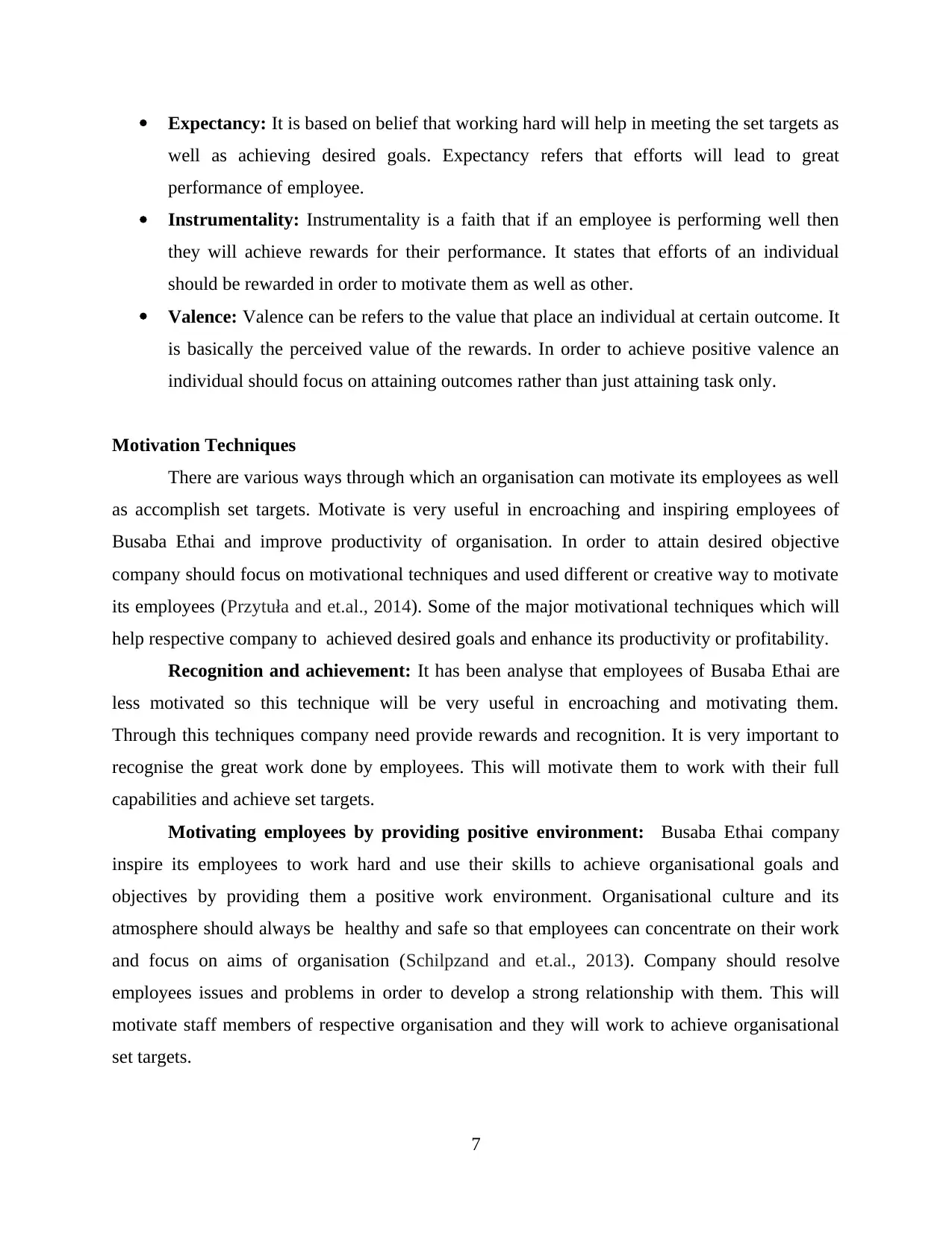
Expectancy: It is based on belief that working hard will help in meeting the set targets as
well as achieving desired goals. Expectancy refers that efforts will lead to great
performance of employee.
Instrumentality: Instrumentality is a faith that if an employee is performing well then
they will achieve rewards for their performance. It states that efforts of an individual
should be rewarded in order to motivate them as well as other.
Valence: Valence can be refers to the value that place an individual at certain outcome. It
is basically the perceived value of the rewards. In order to achieve positive valence an
individual should focus on attaining outcomes rather than just attaining task only.
Motivation Techniques
There are various ways through which an organisation can motivate its employees as well
as accomplish set targets. Motivate is very useful in encroaching and inspiring employees of
Busaba Ethai and improve productivity of organisation. In order to attain desired objective
company should focus on motivational techniques and used different or creative way to motivate
its employees (Przytuła and et.al., 2014). Some of the major motivational techniques which will
help respective company to achieved desired goals and enhance its productivity or profitability.
Recognition and achievement: It has been analyse that employees of Busaba Ethai are
less motivated so this technique will be very useful in encroaching and motivating them.
Through this techniques company need provide rewards and recognition. It is very important to
recognise the great work done by employees. This will motivate them to work with their full
capabilities and achieve set targets.
Motivating employees by providing positive environment: Busaba Ethai company
inspire its employees to work hard and use their skills to achieve organisational goals and
objectives by providing them a positive work environment. Organisational culture and its
atmosphere should always be healthy and safe so that employees can concentrate on their work
and focus on aims of organisation (Schilpzand and et.al., 2013). Company should resolve
employees issues and problems in order to develop a strong relationship with them. This will
motivate staff members of respective organisation and they will work to achieve organisational
set targets.
7
well as achieving desired goals. Expectancy refers that efforts will lead to great
performance of employee.
Instrumentality: Instrumentality is a faith that if an employee is performing well then
they will achieve rewards for their performance. It states that efforts of an individual
should be rewarded in order to motivate them as well as other.
Valence: Valence can be refers to the value that place an individual at certain outcome. It
is basically the perceived value of the rewards. In order to achieve positive valence an
individual should focus on attaining outcomes rather than just attaining task only.
Motivation Techniques
There are various ways through which an organisation can motivate its employees as well
as accomplish set targets. Motivate is very useful in encroaching and inspiring employees of
Busaba Ethai and improve productivity of organisation. In order to attain desired objective
company should focus on motivational techniques and used different or creative way to motivate
its employees (Przytuła and et.al., 2014). Some of the major motivational techniques which will
help respective company to achieved desired goals and enhance its productivity or profitability.
Recognition and achievement: It has been analyse that employees of Busaba Ethai are
less motivated so this technique will be very useful in encroaching and motivating them.
Through this techniques company need provide rewards and recognition. It is very important to
recognise the great work done by employees. This will motivate them to work with their full
capabilities and achieve set targets.
Motivating employees by providing positive environment: Busaba Ethai company
inspire its employees to work hard and use their skills to achieve organisational goals and
objectives by providing them a positive work environment. Organisational culture and its
atmosphere should always be healthy and safe so that employees can concentrate on their work
and focus on aims of organisation (Schilpzand and et.al., 2013). Company should resolve
employees issues and problems in order to develop a strong relationship with them. This will
motivate staff members of respective organisation and they will work to achieve organisational
set targets.
7
⊘ This is a preview!⊘
Do you want full access?
Subscribe today to unlock all pages.

Trusted by 1+ million students worldwide
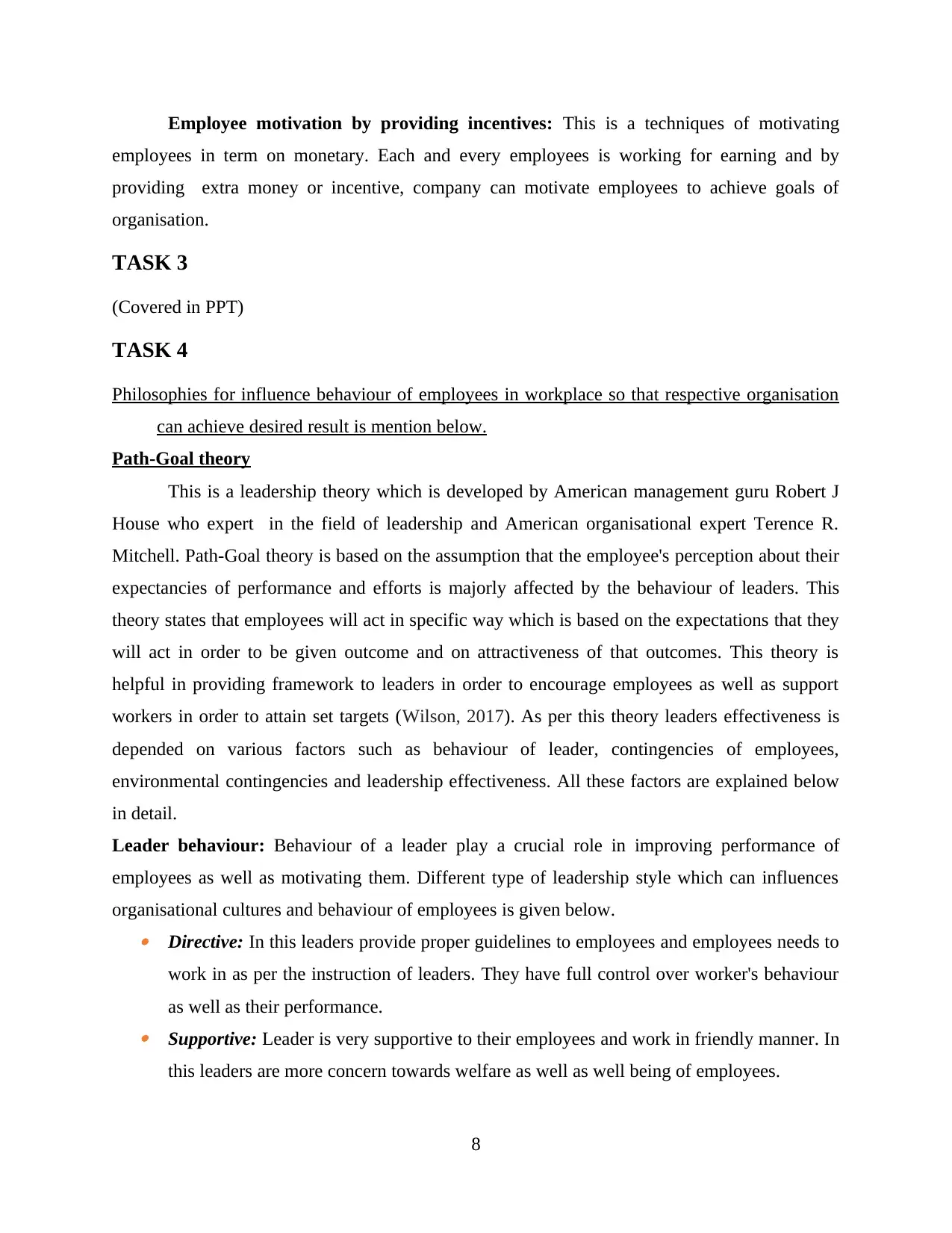
Employee motivation by providing incentives: This is a techniques of motivating
employees in term on monetary. Each and every employees is working for earning and by
providing extra money or incentive, company can motivate employees to achieve goals of
organisation.
TASK 3
(Covered in PPT)
TASK 4
Philosophies for influence behaviour of employees in workplace so that respective organisation
can achieve desired result is mention below.
Path-Goal theory
This is a leadership theory which is developed by American management guru Robert J
House who expert in the field of leadership and American organisational expert Terence R.
Mitchell. Path-Goal theory is based on the assumption that the employee's perception about their
expectancies of performance and efforts is majorly affected by the behaviour of leaders. This
theory states that employees will act in specific way which is based on the expectations that they
will act in order to be given outcome and on attractiveness of that outcomes. This theory is
helpful in providing framework to leaders in order to encourage employees as well as support
workers in order to attain set targets (Wilson, 2017). As per this theory leaders effectiveness is
depended on various factors such as behaviour of leader, contingencies of employees,
environmental contingencies and leadership effectiveness. All these factors are explained below
in detail.
Leader behaviour: Behaviour of a leader play a crucial role in improving performance of
employees as well as motivating them. Different type of leadership style which can influences
organisational cultures and behaviour of employees is given below. Directive: In this leaders provide proper guidelines to employees and employees needs to
work in as per the instruction of leaders. They have full control over worker's behaviour
as well as their performance. Supportive: Leader is very supportive to their employees and work in friendly manner. In
this leaders are more concern towards welfare as well as well being of employees.
8
employees in term on monetary. Each and every employees is working for earning and by
providing extra money or incentive, company can motivate employees to achieve goals of
organisation.
TASK 3
(Covered in PPT)
TASK 4
Philosophies for influence behaviour of employees in workplace so that respective organisation
can achieve desired result is mention below.
Path-Goal theory
This is a leadership theory which is developed by American management guru Robert J
House who expert in the field of leadership and American organisational expert Terence R.
Mitchell. Path-Goal theory is based on the assumption that the employee's perception about their
expectancies of performance and efforts is majorly affected by the behaviour of leaders. This
theory states that employees will act in specific way which is based on the expectations that they
will act in order to be given outcome and on attractiveness of that outcomes. This theory is
helpful in providing framework to leaders in order to encourage employees as well as support
workers in order to attain set targets (Wilson, 2017). As per this theory leaders effectiveness is
depended on various factors such as behaviour of leader, contingencies of employees,
environmental contingencies and leadership effectiveness. All these factors are explained below
in detail.
Leader behaviour: Behaviour of a leader play a crucial role in improving performance of
employees as well as motivating them. Different type of leadership style which can influences
organisational cultures and behaviour of employees is given below. Directive: In this leaders provide proper guidelines to employees and employees needs to
work in as per the instruction of leaders. They have full control over worker's behaviour
as well as their performance. Supportive: Leader is very supportive to their employees and work in friendly manner. In
this leaders are more concern towards welfare as well as well being of employees.
8
Paraphrase This Document
Need a fresh take? Get an instant paraphrase of this document with our AI Paraphraser
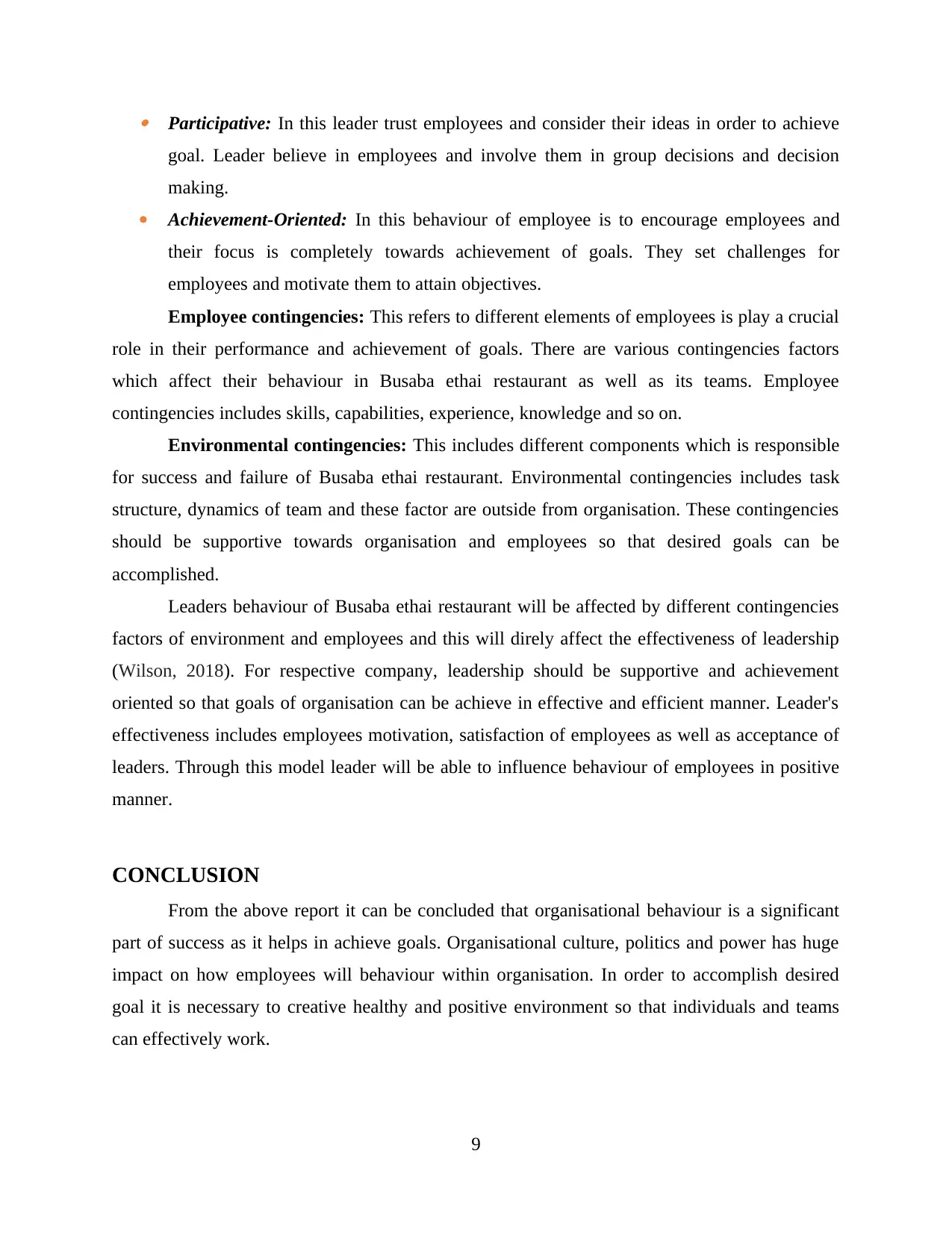
Participative: In this leader trust employees and consider their ideas in order to achieve
goal. Leader believe in employees and involve them in group decisions and decision
making.
Achievement-Oriented: In this behaviour of employee is to encourage employees and
their focus is completely towards achievement of goals. They set challenges for
employees and motivate them to attain objectives.
Employee contingencies: This refers to different elements of employees is play a crucial
role in their performance and achievement of goals. There are various contingencies factors
which affect their behaviour in Busaba ethai restaurant as well as its teams. Employee
contingencies includes skills, capabilities, experience, knowledge and so on.
Environmental contingencies: This includes different components which is responsible
for success and failure of Busaba ethai restaurant. Environmental contingencies includes task
structure, dynamics of team and these factor are outside from organisation. These contingencies
should be supportive towards organisation and employees so that desired goals can be
accomplished.
Leaders behaviour of Busaba ethai restaurant will be affected by different contingencies
factors of environment and employees and this will direly affect the effectiveness of leadership
(Wilson, 2018). For respective company, leadership should be supportive and achievement
oriented so that goals of organisation can be achieve in effective and efficient manner. Leader's
effectiveness includes employees motivation, satisfaction of employees as well as acceptance of
leaders. Through this model leader will be able to influence behaviour of employees in positive
manner.
CONCLUSION
From the above report it can be concluded that organisational behaviour is a significant
part of success as it helps in achieve goals. Organisational culture, politics and power has huge
impact on how employees will behaviour within organisation. In order to accomplish desired
goal it is necessary to creative healthy and positive environment so that individuals and teams
can effectively work.
9
goal. Leader believe in employees and involve them in group decisions and decision
making.
Achievement-Oriented: In this behaviour of employee is to encourage employees and
their focus is completely towards achievement of goals. They set challenges for
employees and motivate them to attain objectives.
Employee contingencies: This refers to different elements of employees is play a crucial
role in their performance and achievement of goals. There are various contingencies factors
which affect their behaviour in Busaba ethai restaurant as well as its teams. Employee
contingencies includes skills, capabilities, experience, knowledge and so on.
Environmental contingencies: This includes different components which is responsible
for success and failure of Busaba ethai restaurant. Environmental contingencies includes task
structure, dynamics of team and these factor are outside from organisation. These contingencies
should be supportive towards organisation and employees so that desired goals can be
accomplished.
Leaders behaviour of Busaba ethai restaurant will be affected by different contingencies
factors of environment and employees and this will direly affect the effectiveness of leadership
(Wilson, 2018). For respective company, leadership should be supportive and achievement
oriented so that goals of organisation can be achieve in effective and efficient manner. Leader's
effectiveness includes employees motivation, satisfaction of employees as well as acceptance of
leaders. Through this model leader will be able to influence behaviour of employees in positive
manner.
CONCLUSION
From the above report it can be concluded that organisational behaviour is a significant
part of success as it helps in achieve goals. Organisational culture, politics and power has huge
impact on how employees will behaviour within organisation. In order to accomplish desired
goal it is necessary to creative healthy and positive environment so that individuals and teams
can effectively work.
9

10
⊘ This is a preview!⊘
Do you want full access?
Subscribe today to unlock all pages.

Trusted by 1+ million students worldwide
1 out of 14
Related Documents
Your All-in-One AI-Powered Toolkit for Academic Success.
+13062052269
info@desklib.com
Available 24*7 on WhatsApp / Email
![[object Object]](/_next/static/media/star-bottom.7253800d.svg)
Unlock your academic potential
Copyright © 2020–2026 A2Z Services. All Rights Reserved. Developed and managed by ZUCOL.





